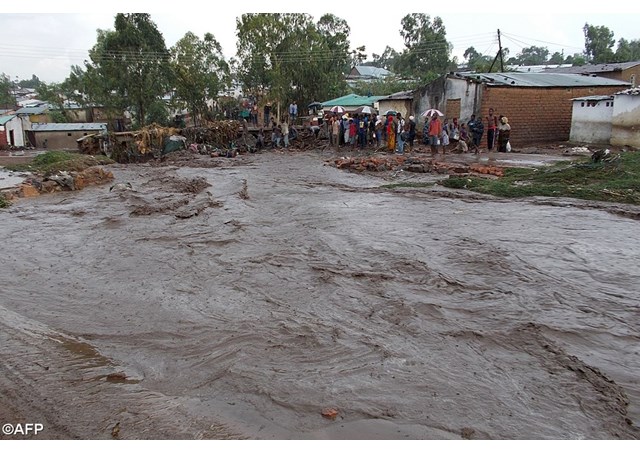
UNDP pledges to assist Malawi recover from floods disaster

In a primary school in Nsanje, Southern Malawi, children have given up their classrooms
and school yard for over 500 displaced families who fled the devastating floods that
hit their nation in January.
More rain is expected in the country, which has already seen over 370,000 people affected
and in need of assistance for food, water and shelter.
The school’s principal, Jimmy Mbamera arrives each day, not to teach his 1000 students
but to observe and monitor the camp that he said will have lasting impact on the school
and its ability to provide education for the children.
“I’m worried about this school when all the IDPs (Internally Displaced Persons) have
left,” he said. “The damage to the school, desks and latrines, will be considerable.”
With a look of resignation he observed the trees planted in the schools grounds. “We
were teaching the children the importance of trees to protect the environment. Our
trees are now being used for firewood by the IDPs,” he said. “I know it has to be
that way but who will help us replant the trees?”
Malawi is regularly hit by floods and droughts. This requires emergency responses of varying size each year. This year, according to the UN News Service, flooding has caused displacement of over 170,000 people, while an estimated 116,000 households have lost their crops and livestock. In Nsanje district alone, 79 people are confirmed dead with another 153 people still missing.
One group arrived at Jimmy’s school, traumatized, exhausted and hungry after their houses were submerged by water and croplands destroyed. After days without food, the refuge of the school and something to eat and drink were lifesaving.
A United Nations (UN) wide effort has been launched to support those in need and
mitigate the potential risks of disease and food shortages. In addition to the important
work provided by the World Food Program (WFP), World Health Organisation (WHO) and
United Nations Children's Fund (UNICEF) in airlifting supplies and providing clean
water and sanitation, United Nations Development Programme (UNDP) and other agencies
are poised to help in early recovery efforts.
Ensuring livelihood, economic and social recovery – reestablishing schools such as
Jimmy Mbamere’s – is crucial.
The United Nations Development Programme (UNDP) is already planning early recovery and has put in place an adviser who will engage with the government and other UN agencies to ensure a comprehensive early recovery strategy.
Two weeks ago and following Malawian President Peter Mutharika's declaration on 13 January 2015 that 15 districts in the country are disaster areas, Pope Francis through the office of Apostolic Nunciature in Malawi conveyed a message of solidarity to the people of Malawi through Archbishop Thomas Msusa, Vice President of the Episcopal Conference of Malawi (ECM).
The message signed by Cardinal Pietro Parolin, Secretary of State at the Vatican read:
"His Holiness Pope Francis, informed of the tragic consequences of the heavy rains in Malawi, has asked me to convey his closeness and solidarity to you and the Catholic faithful, and all beloved people of Malawi. He assures you of his prayers for the victims, their families and all affected by this catastrophe. The Holy Father invokes God’s blessings of strength and perseverance upon those engaged in the massive work of relief, and he expresses his fervent hope that the international community will respond generously and effectively to the needs of the suffering. To all, as a pledge of hope and peace in the Lord, he sends his blessing."
e-mail: engafrica@vatiradio.va
| All the contents on this site are copyrighted ©. |


